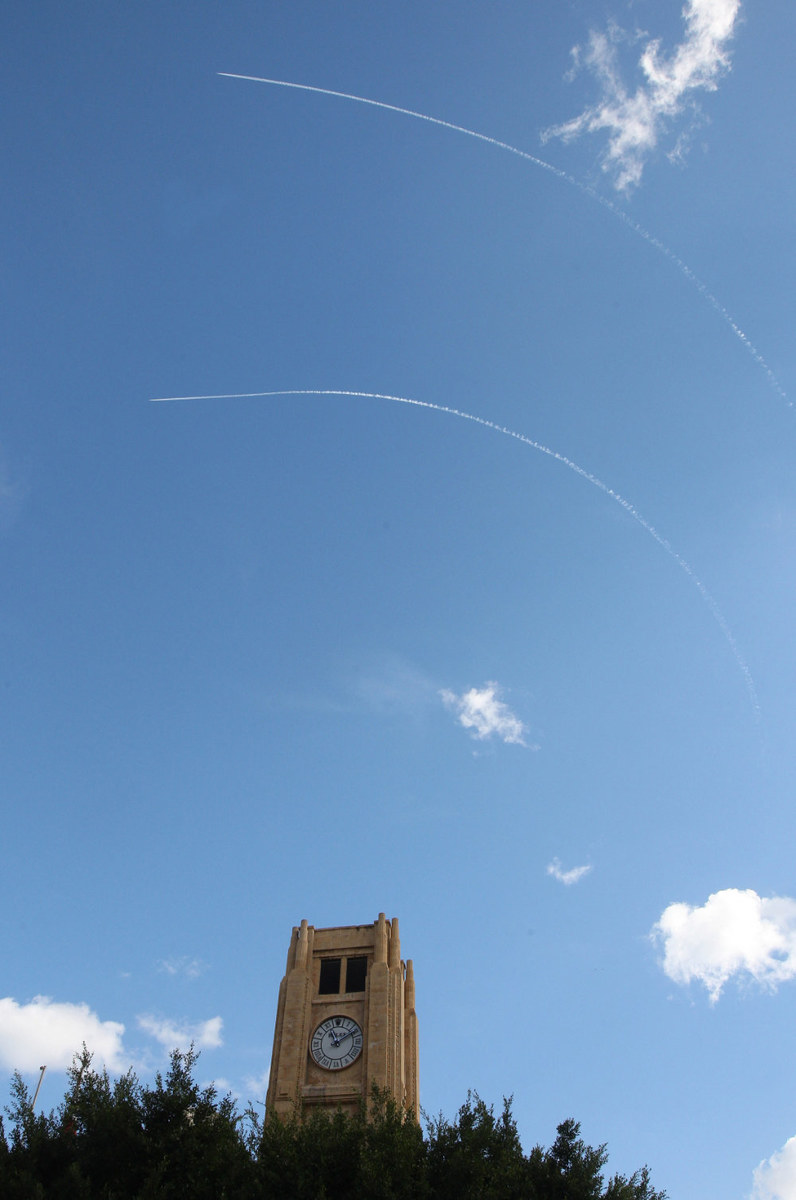BEIRUT: The Lebanese Ministry of Foreign Affairs on Monday condemned “the recent Israeli attack on Syria, and the Israeli enemy’s use of the Lebanese airspace to bomb Syrian territory.”
The previous evening, the Syrian Arab News Agency reported: “Israeli planes bombed sites in the Damascus countryside and the coastal governorate of Tartus, via the Lebanese airspace.”
The Lebanese Foreign Ministry warned of “the consequences of this aggressive behavior and the continuous violation of Lebanese sovereignty in a flagrant breach of international law and treaties.” It added that it “will file a complaint to the (UN) Security Council.”

Israeli airforce jets fly over Beirut while Lebanese parliament members were meeting in downtown Beirut to elect a new president. (AFP file photo)
Aug. 12 marked the 16th anniversary of the approval of UN Resolution 1701, which was designed to end hostilities following Israeli aggression against Lebanon in 2006.
Marking the anniversary, Fouad Siniora, who was Lebanon’s prime minister at the time, said: “Resolution 1701 protected Lebanon and settled the issue of sovereignty in the south in favor of the Lebanese state in the face of the aggressions and ambitions of the Israeli enemy.
“The implementation of Resolution 1701, 16 years ago, stopped the Israeli aggression against Lebanon, preceded by the unanimous decision adopted by the Lebanese Cabinet based on the National Accord document, the constitution and the seven points document regarding the deployment of the Lebanese army in the entire south, after being prohibited from doing so for more than 30 years.”
Siniora added that the Resolution 1701 “confirmed Resolution 1559 in preventing illegal weapons on Lebanese soil, and Resolution 1680 calling for the demarcation of the borders of Lebanon.”
He recalled the great support his country had received at the time from the Gulf Cooperation Council, led by Saudi Arabia, to help rebuild in record time the infrastructure and public facilities that had been destroyed by Israel.
Siniora also accused Hezbollah, without explicitly naming the group, of “seeking to cause more trouble for the Lebanese and the state, including implicating Lebanon in military confrontations and risks that Lebanon cannot confront or bear.”
The condemnation by Lebanese authorities of Sunday’s Israeli attack coincided with visit to Syria on Monday by Issam Sharafeddine, the Lebanese caretaker minister of the displaced. He was leading a ministry delegation in discussions with Syrian authorities about the repatriation of refugees who have been living in Lebanon since the beginning of the civil war.
He met a number of Syrian officials, including Minister of Local Administration and Environment Hussein Makhlouf and Interior Minister Mohammed Khalid Al-Rahmoun. The two sides reportedly discussed a plan for the return of Syrian refugees to their home country in “a safe and dignified” way.
Makhlouf said: “Syria’s doors are open for the refugees’ return and the state is ready to provide them with everything they need, from transportation to hospitalization and education. Syrian authorities will secure water and electricity to the liberated areas and will provide shelters for those whose homes have not been rebuilt yet.”
Authorities in Lebanon want 15,000 Syrian refugees to return home each month, a target that will require the cooperation of the Syrian government. The Lebanese government estimates there are about 1.5 million Syrian refugees in Lebanon, including 880,000 who are registered with the United Nations High Commissioner for Refugees, along with others who have entered the country, legally or illegally, to work.
The Lebanese government has complained about the “weak” financial aid provided by the UN in comparison to the country’s needs in light of the severe economic crisis it has been grappling with for more than three years.














